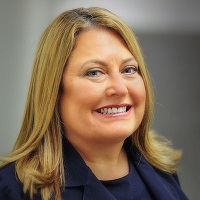Women in Technology: Margaret Kidd Instructional Assistant Professor, Supply Chain and Logistics Technology

Professor Margaret Kidd teaches undergraduate supply chain courses and coordinates student applicants for internships and scholarships. She serves as faculty advisor to the student organization Supply-Chain Industrial Distribution Organization (SIDO) and serves as a liaison for Houston Electric League (HEL) and Exporters Competitive Maritime Council Education Committee Houston (ECMC). Bridging her experiences from working at San Jacinto College, she has secured funding for approximately 200 supply chain students to take the Council of Supply Chain Management Professionals (CSCMP) certification exams within the past year. In partnership with the Houston Urban League, Professor Kidd has assisted with 35 students' job placements, internships, and scholarships.
Professor Kidd came to the University of Houston after a rewarding career in sales management, which heavily focused on achieving challenging goals. She has received awards for study abroad and international research programs at both UH-Clear Lake and Texas Southern University, scholarships from the National Defense Transportation Association and the International Transportation Management Association, a doctorial assistantship at Texas Southern University, and has been recognized as leading the most successful Trade Adjustment Assistance Community College Career Training Literacy Information and Communication System grant within a consortium of nine colleges and three universities. A popular panelist and moderator for academic and industry conferences, she has participated in the 2016 Council of Supply Chain Management Professional Annual Conference in Orlando, the Petrochemical and Logistics Conference in Houston, and the Georgia Tech Physical Internet Conference in Atlanta. Recently, she presented with Ana Reyes, executive director of the Logistics Cabinet, Ministry of the Presidency Panama at the Port Logistics: What's Next? Conference, sponsored by Georgia Ports of Authority, Port of Rotterdam, University of Groningen and Georgia Tech University.
Q: What is your research focus and what inspired you to pursue an academic career in STEM?
A: My research area relates to how ports interface with cities—an interest that evolved from experiences while growing on Galveston Bay and seeing the changing land uses such as the development of Barbour's Cut Marine Terminal in the 70's followed by Bayport Container Terminal in the early 2000's. I was inspired to be a voice for those whose voices were not heard where heavy industry and residential communities coexist. Understanding the history over the last several hundred years regarding changing land uses (near ports and city centers around the globe) and best practices for incorporating inclusiveness, accessibility, public art and communities led me to working with undergraduate supply chain majors, as these students are critical connectors between the economic engines of our ports and corresponding cities.
Q: How will your work change the future?
A: One can only hope that students are inspired and take a kernel of knowledge they learned through their course of study or industry engagement activity and do something remarkable with it. I believe there are students who have been introduced to what is possible under their course of study with me. As I continue doctoral studies in urban planning and environmental policy, I intend to focus on port-city interface and look forward to seeing the expansion of public art in areas of transition near our ports and heavy industry.
Q: How have role models or mentors influenced your personal and career?
A: My first significant role model in academia was a professor at the University of Houston-Clear Lake. I had left Wall Street in pursuit of something more beneficial to society and intellectually stimulating. After enrolling in a master's program in Cross-Cultural Studies in fall 2007, it was almost as if I had walked into a candy store for knowledge. I traveled with her and a group of peers to the Middle East. She was able to contextual the shared values and common ground among, Christianity, Judaism, and Islam. Additionally, through non-traditional learning methods, she was able to assist in our understanding of the world from a much broader lens.